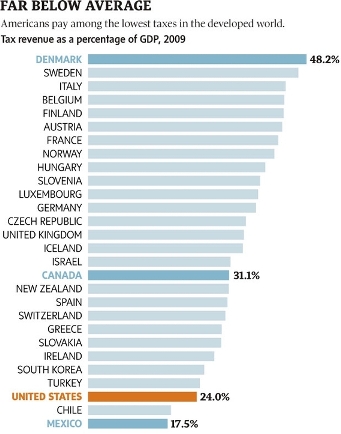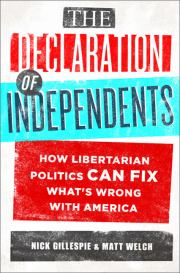After Warren Buffet suggested that rich people like him should pay more taxes, conservatives predictably encouraged him to voluntarily give more money to the government if he so desperately desires to do so. (E.g., from Michelle Bachmann: “If he’s worried about being undertaxed, we’d suggest he simply write a big check to Uncle Sam and go back to his day job of picking investments.”)
Jonathan Chait then replies:
Obviously this fails to grasp the fundamental collective action problem that’s the entire basis for taxation. You obviously can’t fund the government on the basis of voluntary donations. Buffett and other wealthy people who favor higher taxes on the rich don’t just believe they should pay more taxes. They believe the government needs more revenue. It’s amazing how many conservatives continue to think this just-pay-more response constitutes some kind of slam dunk rebuttal.
This seems like a sensible reply, but I don’t think it fully excuses Buffet’s behavior. This situation is best thought of as a prisoner’s dilemma-style situation (as it was framed by the commenters at Steve Landsburg’s site): The optimal solution from Warren Buffet’s perspective is for all rich people except him to have their taxes raised. Of course he won’t try to push that idea, as he could never gain any traction with it. The 2nd best option (in his opinion) is for all rich people to have their taxes raised (and that’s the option he pushes). The 3rd best is for nobody’s taxes to be raised, and the worst is for only his taxes to be raised. (For example these rankings would apply if Buffet gets 5 units of pleasure for every dollar he has, 2 units for every dollar a poor person has, and 1 unit for every dollar another rich person has).
(Note that if the 1st and 2nd options were reversed, then Buffet would immediately give away a lot of money to the government, which he has not done, despite Bachmann’s encouragement. Thus I believe the above ordering is correct, and the prisoner’s dilemma description applies.)
When viewed in this way, Buffet’s disingenuousness comes into full view, and Chait’s defense of Buffet can be seen to be lacking. Buffet’s op-ed gives the sense that a sense of fairness and justice should compel us to have the rich pay more in taxes, to alleviate the suffering of the poor:
Most [rich] wouldn’t mind being told to pay more in taxes as well, particularly when so many of their fellow citizens are truly suffering….
This cut helps the poor and the middle class, who need every break they can get.
This sort of language really does not seem to comport with Buffet’s failure to donate money to the government voluntarily. The 2nd sentence would only be consistent with his action if he amended it to read “This cut helps the poor and the middle class, who need every break they can get, except for those breaks that affect my own pocketbook without affecting other rich peoples’.” It doesn’t make sense to suggest that a sense of sympathy for the needy should compel the rich among us to donate to the poor, yet that same sense of sympathy should not compel the richest among us (i.e. Buffet) to donate to the very poorest (a donation whose marginal benefit would almost certainly exceed the average benefit of having all of the rich donate to the poor).
Buffet should admit that, as the prisoner’s dilemma analogy shows, his behavior (not donating + advocating for higher taxes) stems from a desire to be as rich as he possibly can be at the expense of poor people if necessary, combined with a preference for poor people to become richer at the expense of rich people other than himself. This is hardly the paragon of a philanthropic attitude.
If Buffet wants higher taxes, he should feel free to keep advocating for them. But he should drop guilt-tripping as his primary method of argument.


